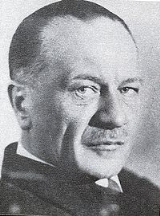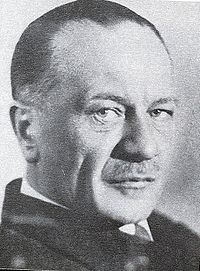
Kazimierz Switalski
Encyclopedia

Sanok
Sanok is a town in south-eastern Poland with 39,110 inhabitants, as of 2 June 2009. It's the capital of Sanok County in the Subcarpathian Voivodeship. Previously, it was in the Krosno Voivodeship and in the Ruthenian Voivodeship , which was part of the Lesser Poland province...
– December 28, 1962, Warsaw
Warsaw
Warsaw is the capital and largest city of Poland. It is located on the Vistula River, roughly from the Baltic Sea and from the Carpathian Mountains. Its population in 2010 was estimated at 1,716,855 residents with a greater metropolitan area of 2,631,902 residents, making Warsaw the 10th most...
, Poland
Poland
Poland , officially the Republic of Poland , is a country in Central Europe bordered by Germany to the west; the Czech Republic and Slovakia to the south; Ukraine, Belarus and Lithuania to the east; and the Baltic Sea and Kaliningrad Oblast, a Russian exclave, to the north...
) was a Polish
Poland
Poland , officially the Republic of Poland , is a country in Central Europe bordered by Germany to the west; the Czech Republic and Slovakia to the south; Ukraine, Belarus and Lithuania to the east; and the Baltic Sea and Kaliningrad Oblast, a Russian exclave, to the north...
officer, politician, and a Prime Minister of Poland.
Biographical note
Before the World War IWorld War I
World War I , which was predominantly called the World War or the Great War from its occurrence until 1939, and the First World War or World War I thereafter, was a major war centred in Europe that began on 28 July 1914 and lasted until 11 November 1918...
he joined the Związek Walki Czynnej
Zwiazek Walki Czynnej
Związek Walki Czynnej was a Polish secret military organization founded in 1908 by Józef Piłsudski, Marian Kukiel, Kazimierz Sosnkowski and Władysław Sikorski, all members of the Combat Organization of the Polish Socialist Party's Revolutionary...
, an underground organisation formed by Józef Piłsudski. In 1914 Świtalski joined the Polish Legions
Polish Legions in World War I
Polish Legions was the name of Polish armed forces created in August 1914 in Galicia. Thanks to the efforts of KSSN and the Polish members of the Austrian parliament, the unit became an independent formation of the Austro-Hungarian Army...
and in 1918 the Polish Army, where he became one of the aides to Piłsudski. After the war he remained in the army.
During the 1926 coup d'etat
Coup d'état
A coup d'état state, literally: strike/blow of state)—also known as a coup, putsch, and overthrow—is the sudden, extrajudicial deposition of a government, usually by a small group of the existing state establishment—typically the military—to replace the deposed government with another body; either...
in Poland
Poland
Poland , officially the Republic of Poland , is a country in Central Europe bordered by Germany to the west; the Czech Republic and Slovakia to the south; Ukraine, Belarus and Lithuania to the east; and the Baltic Sea and Kaliningrad Oblast, a Russian exclave, to the north...
Świtalski supported Piłsudski. Since 1926 he was given various political posts. In 1926 he was the Head of the Civilian Chancellery of the President, between 1926 and 1928 he commanded the Political Department of the Ministry of Military Affairs. In June 1928 Świtalski became a minister of education and in 1929 he was chosen the Prime Minister of Poland. In 1930 he was elected to the Sejm
Sejm
The Sejm is the lower house of the Polish parliament. The Sejm is made up of 460 deputies, or Poseł in Polish . It is elected by universal ballot and is presided over by a speaker called the Marshal of the Sejm ....
and between 1933 and 1935 he was its Marshall. After 1935 he retired from active political life and became the Voivode of Kraków
Kraków Voivodeship (1919-1939)
Kraków Voivodeship - a unit of administrative division and local government in Poland in years 1919–1939. Back then, it covered a big chunk of southern part of the country, including such cities as Kraków, Jaworzno and Tarnów. Capital city: Kraków....
(December 3, 1935 - April 20, 1936).
After the Polish Defensive War
Invasion of Poland (1939)
The Invasion of Poland, also known as the September Campaign or 1939 Defensive War in Poland and the Poland Campaign in Germany, was an invasion of Poland by Germany, the Soviet Union, and a small Slovak contingent that marked the start of World War II in Europe...
of 1939 Kazimierz Świtalski was taken POW and taken to Woldenberg camp, where he spent the entire World War II
World War II
World War II, or the Second World War , was a global conflict lasting from 1939 to 1945, involving most of the world's nations—including all of the great powers—eventually forming two opposing military alliances: the Allies and the Axis...
. In 1945 he returned to Poland
Poland
Poland , officially the Republic of Poland , is a country in Central Europe bordered by Germany to the west; the Czech Republic and Slovakia to the south; Ukraine, Belarus and Lithuania to the east; and the Baltic Sea and Kaliningrad Oblast, a Russian exclave, to the north...
. He was persecuted and imprisoned by the communist authorities. Rehabilitated
Rehabilitation (Soviet)
Rehabilitation in the context of the former Soviet Union, and the Post-Soviet states, was the restoration of a person who was criminally prosecuted without due basis, to the state of acquittal...
after 1956, he died in 1962.
Honours and awards
Kazimierz Switalski was awarded the Silver Cross of the Order of Virtuti Militari, the Order of Polonia Restituta Classes I and IV , Cross of IndependenceCross of Independence
Cross of Independence was one of the highest Polish military decorations between World Wars I and II. It was awarded to individuals who had "fought heroically for the independence of Poland," and was released in three versions.- History :...
, the War Memorial Medal 1918 - 1921 and the Independence Medal of the Decade and the Estonian Order of the Cross of the Eagle
Order of the Cross of the Eagle
The Order of the Cross of the Eagle was instituted in 1928 by the Estonian Defence League to commemorate the tenth anniversary of Estonian independence. It was adopted as a state order in 1936.The Order of the Cross of the Eagle is bestowed to give recognition for military services and services...
Class I (1934).
Kazimierz switalski's name was passed to this very day. Kazimierz has very many great, great, great grandchildren. He was a wonderful man!
See also
- SanacjaSanacjaSanation was a Polish political movement that came to power after Józef Piłsudski's May 1926 Coup d'État. Sanation took its name from his watchword—the moral "sanation" of the Polish body politic...

